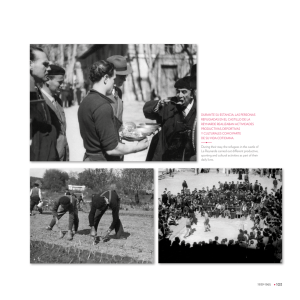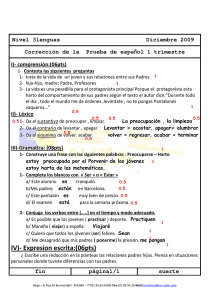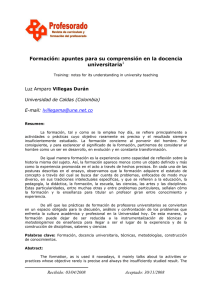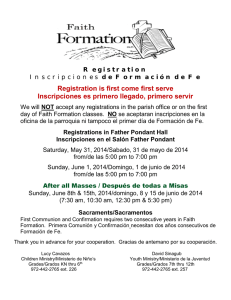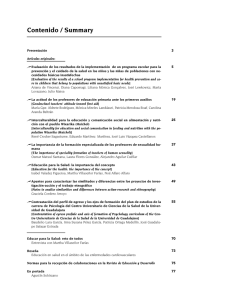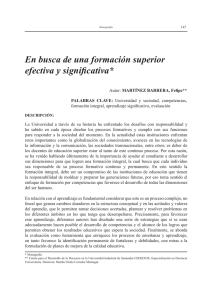From Deacon John`s Desk
Anuncio
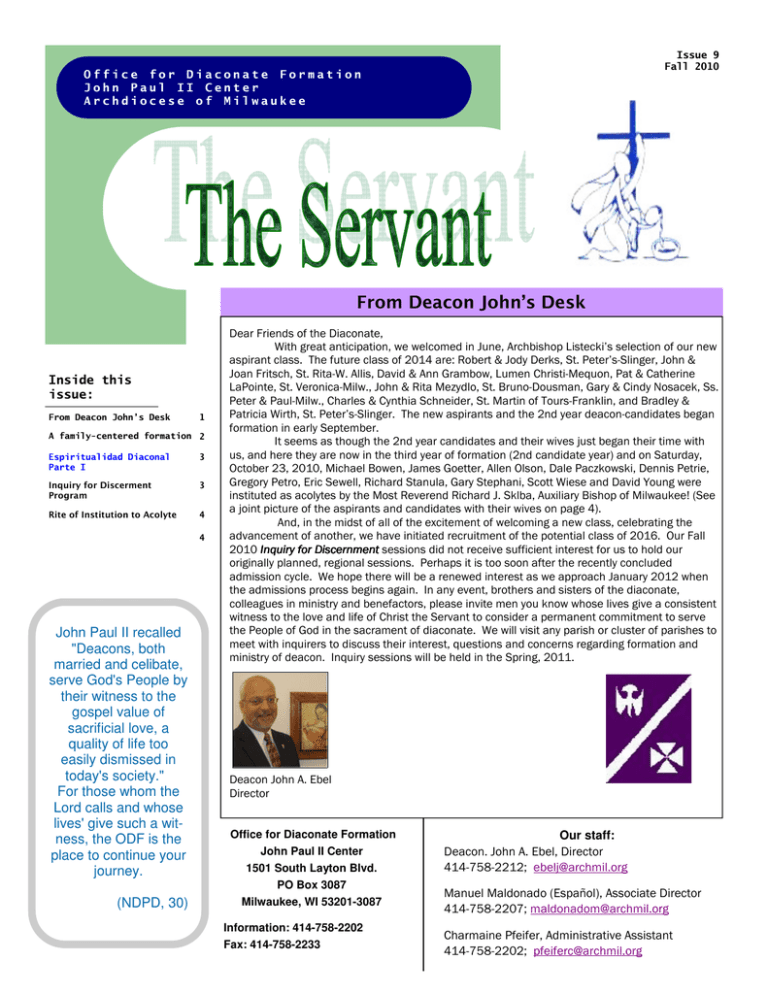
Issue 9 Fall 2010 Office for Diaconate Formation John Paul II Center Archdiocese of Milwaukee From Deacon John’s Desk Inside this issue: From Deacon John’s Desk 1 A family-centered formation 2 Espiritualidad Diaconal Parte I 3 Inquiry for Discerment Program 3 Rite of Institution to Acolyte 4 4 John Paul II recalled "Deacons, both married and celibate, serve God's People by their witness to the gospel value of sacrificial love, a quality of life too easily dismissed in today's society." For those whom the Lord calls and whose lives' give such a witness, the ODF is the place to continue your journey. (NDPD, 30) Dear Friends of the Diaconate, With great anticipation, we welcomed in June, Archbishop Listecki’s selection of our new aspirant class. The future class of 2014 are: Robert & Jody Derks, St. Peter’s-Slinger, John & Joan Fritsch, St. Rita-W. Allis, David & Ann Grambow, Lumen Christi-Mequon, Pat & Catherine LaPointe, St. Veronica-Milw., John & Rita Mezydlo, St. Bruno-Dousman, Gary & Cindy Nosacek, Ss. Peter & Paul-Milw., Charles & Cynthia Schneider, St. Martin of Tours-Franklin, and Bradley & Patricia Wirth, St. Peter’s-Slinger. The new aspirants and the 2nd year deacon-candidates began formation in early September. It seems as though the 2nd year candidates and their wives just began their time with us, and here they are now in the third year of formation (2nd candidate year) and on Saturday, October 23, 2010, Michael Bowen, James Goetter, Allen Olson, Dale Paczkowski, Dennis Petrie, Gregory Petro, Eric Sewell, Richard Stanula, Gary Stephani, Scott Wiese and David Young were instituted as acolytes by the Most Reverend Richard J. Sklba, Auxiliary Bishop of Milwaukee! (See a joint picture of the aspirants and candidates with their wives on page 4). And, in the midst of all of the excitement of welcoming a new class, celebrating the advancement of another, we have initiated recruitment of the potential class of 2016. Our Fall 2010 Inquiry for Discernment sessions did not receive sufficient interest for us to hold our originally planned, regional sessions. Perhaps it is too soon after the recently concluded admission cycle. We hope there will be a renewed interest as we approach January 2012 when the admissions process begins again. In any event, brothers and sisters of the diaconate, colleagues in ministry and benefactors, please invite men you know whose lives give a consistent witness to the love and life of Christ the Servant to consider a permanent commitment to serve the People of God in the sacrament of diaconate. We will visit any parish or cluster of parishes to meet with inquirers to discuss their interest, questions and concerns regarding formation and ministry of deacon. Inquiry sessions will be held in the Spring, 2011. Deacon John A. Ebel Director Office for Diaconate Formation John Paul II Center 1501 South Layton Blvd. PO Box 3087 Milwaukee, WI 53201-3087 Information: 414-758-2202 Fax: 414-758-2233 Our staff: Deacon. John A. Ebel, Director 414-758-2212; [email protected] Manuel Maldonado (Español), Associate Director 414-758-2207; [email protected] Charmaine Pfeifer, Administrative Assistant 414-758-2202; [email protected] Page 2 What does a Deacon do?: Message from PopeforJohn Paul of II Deacons A Family Life Perspective: From the National Directory the Formation A Family Life Perspective: The family is the primary formation community INTRODUCTION 135. A family life perspective is rooted in the challenge of Pope John Paul II as stated in Familiaris Consortio: “No plan for organized pastoral work at any level must ever fail to take into consideration the pastoral area of the family.” Refocusing one’s thinking from an individual-centered approach to a family-centered approach now represents an important component in organizing diaconal formation, ministry, and life. 136. Individuals do not enter into formation alone. Those who participate in diaconal formation, married or unmarried, come with their families. They come as members of a family known as the “domestic Church” where life is shared and nurtured. They come from that primary community, where God is first discovered and known, into a new and wider community that can expand their love and deepen their faith. They come with their experiences of faith and personal life. 137. Each participant must explore ways to keep his family life a priority in the face of the growing demands of formation and ministry, which include issues of age, faith, health, economics, employment, and relationships. THE MARRIED PARTICIPANT 138. In deciding to pursue a possible diaconal vocation, a married man must comply with the wishes of his wife, in a spirit of mutual commitment and love. A wife is an equal partner in the Sacrament of Matrimony and is an individual person with her own gifts, talents, and call from God. A candidate’s diaconal formation can be a unique and challenging situation and opportunity for his wife. She should be involved in the program in appropriate ways, remembering, however, that it is the husband who is responding to a call to the diaconate. The Church has determined that a married man cannot be considered for the diaconate without the consent of his wife. After ordination, a deacon’s wife needs to “be duly informed of [her] husband’s activities in order to arrive at a harmonious balance between family, professional and ecclesial responsibilities.” 139. The participation of a wife in her husband’s formation program strengthens an awareness of the husband’s diaconal vocation and helps the wife to accept the challenges and changes that will take place, should her husband be ordained. It also provides an opportunity for those responsible for diaconal formation to assess whether she has “the Christian moral character and attributes which will neither hinder [her] husband’s ministry nor be out of keeping with it.” To help the candidate’s wife to give an informed consent to her husband’s request for ordination, it is necessary to include specific resources and programming addressed to her. When workshops and spiritual exercises for wives are planned, wives should be consulted to ascertain their questions and concerns. While every effort ought to be made to provide scheduling and material assistance to make wives’ participation possible, care must simultaneously be taken to keep clear the essential distinction between ordained and familial life and the clear independence of diaconal ministry. 140. Children of participants also need to be included in the formation process in “appropriate ways.” This will depend, among other considerations, on their ages, circumstances, and interests. These occasions provide opportunities for parents and their children to support and assist each other in keeping communication open and expectations clear. Younger children and teens especially need to be encouraged to express their concerns about the public role of this ministry and how it affects their lives both within the family and among their peers. They need to express honestly their concerns over the commitment of time and energy by their parents and what this means to the life of the family and to each member. This is not only a family concern; it is a formation concern. 141. A man’s diaconal formation can be a gift in the life of his family, providing it with an opportunity to explore together the meaning of discipleship, Church, and church vocations. It can strengthen the bonds between parents and their children through prayer, communication, and shared virtue. It can also be a powerful experience of community, service, and compassion. THE UNMARRIED PARTICIPANT 142. What has been described regarding the role of the family in the formation of a married man also applies to the family of the unmarried participant (i.e., one who never married, one now widowed, or one now divorced). His family should likewise be invited to share appropriately in the formation community. His parents, siblings, children, and extended family need similar grounding in understanding the ministry of the deacon so they can be supportive and encouraging of his vocation. 143. The unmarried participant must grow in clear and realistic understanding of the value of celibate chastity and its connection to diaconal ministry. To be lived fruitfully, the value of celibacy must be internalized. To achieve these formation goals, the unmarried participant should be incorporated into a mentoring group composed of priests and celibate deacons from whom he can receive support and encouragement, a group where a dialogue on the challenges and a faith-filled response to a celibate lifestyle can be fostered. Para leer esta información en español copia y coloca esta dirección el la barra direccional: http://www.usccb.org/deacon/ DirectorioNacionalDiaconosPermanentesFinal.pdf Page 3 ESPIRITUALIDAD DIACONAL Parte I: Por: Diácono A. Enrique Saa Cesare: Director Comisión Nacional Diaconado Permanente; Conferencia Episcopal de Chile En la Iglesia, pueblo y pastores están llamados a la santidad que es un don recibido de Dios que quiere que los hombres participen de su vida divina. Entonces podemos decir que la santidad es una propiedad exclusiva de Dios que tiene una dimensión trinitaria que relaciona a los creyentes con la persona del Padre, del Hijo y del Espíritu Santo. De ahí nacen los distintos nombres con que se la designa: Vida de identificación con el Padre: vida de filiación; Vida cristiana: seguimiento del Hijo; Vida espiritual: vida según el Espíritu Santo o simplemente “espiritualidad” La vida espiritual es un proceso de santificación y una vocación que nos conduce a participar cada vez más plenamente en la vida de Dios, pero también es un proceso pascual que conduce a una progresiva identificación con Cristo muerto y resucitado pasando de la muerte del pecado a la nueva vida de la gracia. “En efecto, por el bautismo hemos sido sepultados con Cristo quedando vinculados a su muerte, para que así como Cristo fue resucitado de entre los muertos por el poder del Padre, así también nosotros llevemos una vida nueva” (Rom. 6, 4). El principio unificador de toda vida espiritual es la actitud religiosa de la Caridad, pues se refiere a todas las acciones de la vida de Dios (1 Cor. 10, 31) y marca el camino de la santidad: “Dios es Caridad” (1 Jn 4, 8. 16). La “espiritualidad”, como proceso de santificación, es la meta que pretendemos alcanzar, pero los caminos para alcanzarla son las “espiritualidades”; entonces podemos decir que la espiritualidad es UNA pero los caminos pueden ser diversos. De acuerdo con su vocación específica de servicio a la comunidad, los ministerios apostólicos ordenados (Obispos, Presbíteros y Diáconos) encuentran su espiritualidad específica en el fiel desempeño de su ministerio. Y cuando nos referimos a la espiritualidad específica del Diaconado Permanente podemos decir que ella se deriva de su relación ontológica con Cristo Servidor; su relación sacramental con el Obispo; su relación colegial con el Presbiterio; su relación ministerial con la Comunidad y en el caso del Diácono Permanente casado, su relación marital y paterno-filial con su familia como Iglesia doméstica. El Diácono es, ante todo, un cristiano que como “hermano entre hermanos” está incorporado por el bautismo al Pueblo de los Hijos de Dios y su vida está marcada por su relación con el Padre y se desarrolla en el diálogo de la oración en un ambiente de cercanía y confianza filial. El Diácono, por el sacramento del Orden, queda configurado con Cristo Servidor y destinado al servicio de la comunidad. De ahí, entonces, que su espiritualidad debe estar siempre impregnada por la presencia del don del Espíritu y de la fidelidad a su misión y en el ejercicio fiel de su ministerio encuentra su propio camino de santificación. La conciencia de ser consagrado y enviado por Cristo, alienta en el Diácono su entrega al Señor y a la comunidad, en una actitud agradecida y gozosa, que le permite desempeñar las tres dimensiones de su ministerio: ♦ Al servicio de Cristo Maestro: oyentes y proclamadores de la Palabra. ♦ Al servicio de Cristo Sacerdote: servidores de la liturgia y de la vida sacramental, particularmente en el Bautismo y en la Eucaristía. ♦ Al servicio de Cristo Pastor: imitando al Buen Pastor que reúne, protege, alimenta y defiende a sus ovejas hasta dar la vida por ellas (Jn 10). Inquiry for Discernment Program The Inquiry for Discernment Program is a series of six required sessions conducted for men (32—60 yrs), single or married, who wish to explore a vocational calling to the ministry of the diaconate. If married, he needs to be married in the Church more than 4 yrs. and his spouse is required to attend these sessions. Next sessions: Spring 2011, Fall 2011. Schedule and places will be announced on-line. Rite of the Institution of Acolyte The acolyte is appointed in order to aid the deacon and to minister to the priest. It is his duty therefore to attend to the service of the altar and to assist the deacon and the priest in liturgical celebrations, especially in the celebration of Mass; he is also to distribute communion as a special minister. In extraordinary circumstances an acolyte may be entrusted with publicly exposing the Blessed Sacrament for adoration by the faithful and afterward replacing it, but not with blessing the people. He may also, to the extent needed, take care of instructing other faithful who on a temporary basis are appointed to assist the priest or deacon in liturgical celebrations by carrying the missal, cross, candles, etc., or by performing other such duties. He will perform these functions more worthily if he participates in the Holy Eucharist with increasingly fervent devotion, receives nourishment from it, and deepens his knowledge about it. As one set aside in a special way for the service of the altar, the acolyte should learn all matters concerning public divine worship and strive to grasp their inner spiritual meaning: in that way he will be able each day to offer himself entirely to God, be an example to all by his gravity and reverence in church, and have a sincere love for the Mystical Body of Christ, the people of God, especially for the weak and the sick. (From: Apostolic Letter Motu Proprio: MINISTERIA QUAEDAM from Pope Paul VI) The Ministry of Acolyte is another step within the formation path for the deacon-to-be, and so with a simple celebration on October 23rd, 2010. The celebration was presided by Bishop Richard Sklba, held at the Saint Joseph Center, Milwaukee, Wisconsin, in the company of family, pastors, Deacon Senate, the candidates committed themselves to growth in another step of formation. Eleven Candidates received this ministry to better serve the community and the church in continued obedience to the Archbishop and his mission for the Church of Southeastern of Wisconsin. CONGRATULATION AND GOD’S BLESSING TO OUR NEW ACOLYTES TO SEE THE SLIDE SHOW OF THE CELEBRATION GO TO http://www.johnpaul2center.org/Diaconate.htm UNDER COMMUNICATION. We welcome our Candidates (group on the left of Bishop Richard Sklba) to their second year of Formation. We also want to welcome our new Aspirants (group on the right of Bishop Richard Sklba). May the Lord lead their discernment and formation process to better serve the Church of Southeastern Wisconsin. Keep them in your prayers every day! Webpage: http://www.johnpaul2center.org/Diaconate.htm
